The Battle of Lepanto in Greece, October 7, 1571
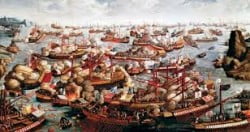 The Bay of Lepanto lies beyond the Isthmus of Corinth connecting the Peloponnesus with mainland Greece. A sea battle was fought here on October 7, 1571 that decided the fate of Christendom.
The Bay of Lepanto lies beyond the Isthmus of Corinth connecting the Peloponnesus with mainland Greece. A sea battle was fought here on October 7, 1571 that decided the fate of Christendom.
The events leading to Lepanto began in the early 7th century when a young camel driver emerged from the desert of Arabia and claimed to be the Prophet of Allah. From this modest beginning, Islam began to spread rapidly. By the time the Prophet died, all Arabs, whether by persuasion or by the sword, had accepted Islam.
In 638, Caliph Oman, Mohammed’s successor, rode into Jerusalem and took control of the Holy Land. Spain fell to Islamic rule in 712. Muslim armies crossed the Pyrennes and reached as far north as Pointers, France before being stopped by Charles Martel in 732.
The Turks were a nomadic tribe that embraced Islam. They spread their newly found religion throughout the Middle East, and with the zeal of converts, began a campaign against Western Europe. In the Mediterranean region, the Turks consolidated Islamic power and united under one sovereign, Suleiman the Magnificent. Suleiman was virtually undefeated in battle and so powerful that he considered himself the undisputed Sultan of East and West. His grandfather had vowed to stable his horses beneath the Dome of St. Peter’s in Rome and to wind the Pope’s head with a turban. The Sultan was now in a position to fulfill his grandfather’s dream.
The Knights of Malta
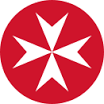 There was only one slight detail that Suleiman the Magnificent needed to tend to before striking Europe. This detail was a Christian outpost located on the Island of Malta. The knights of St. John had retreated to the Island of Malta in 1565, when they were driven from Rhodes by the Turks. From their new position on Malta, the Knights of St. John could and did harass Turkish fleets as they sailed back and forth from Constantinople, the capital of the Ottoman Turkish Empire, to Tripoli in Northern Africa. Suleiman the Magnificent decided that it was time to attack Malta.
There was only one slight detail that Suleiman the Magnificent needed to tend to before striking Europe. This detail was a Christian outpost located on the Island of Malta. The knights of St. John had retreated to the Island of Malta in 1565, when they were driven from Rhodes by the Turks. From their new position on Malta, the Knights of St. John could and did harass Turkish fleets as they sailed back and forth from Constantinople, the capital of the Ottoman Turkish Empire, to Tripoli in Northern Africa. Suleiman the Magnificent decided that it was time to attack Malta.
It is recorded that the flagship that led the Sultan’s fleet against Malta on that day was the largest and most beautiful ship that was ever seen in the Bosporus. It was a showcase of Turkish power and authority. The Knights of Malta, who had pledged themselves to fight Islam, fought a battle that “has become a legend of heroism.” Badly outnumbered, the Knights stood their ground and at the end of the siege, three-quarters of the Turks perished leaving only 600 Knights alive on the entire island. The remainder of the Turkish fleet limped back to Constantinople to rebuild their armada while making plans to reclaim their honor and prestige.
Saint Pope Pius V
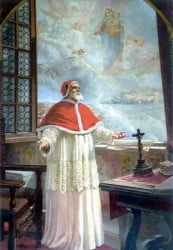 The man who assumed the task of stemming the Islamic tide on the one hand, and of strengthening the nerve of the quaking Christian princes on the other, was not a bellicose statesman of great political prowess, but a monk of humble origin upon whom the mantle of the Papacy fell. He was a Dominican, Pope Pius V. He was quite tireless in his efforts to rally the Christian princes. As it stood, Christian Europe was beginning to cave in under the force of Islamic pressure. Both Germany and France were making conciliatory noises to Constantinople, even hoping for a share in the seemingly inevitable event of Turkish victory.
The man who assumed the task of stemming the Islamic tide on the one hand, and of strengthening the nerve of the quaking Christian princes on the other, was not a bellicose statesman of great political prowess, but a monk of humble origin upon whom the mantle of the Papacy fell. He was a Dominican, Pope Pius V. He was quite tireless in his efforts to rally the Christian princes. As it stood, Christian Europe was beginning to cave in under the force of Islamic pressure. Both Germany and France were making conciliatory noises to Constantinople, even hoping for a share in the seemingly inevitable event of Turkish victory.
There were only two nations that were even vaguely interested in forming a buttress for Christendom. These two nations were Venice and Spain. Venice, on the Adriatic, had waged a largely ineffective defensive war against the Turks. They had managed, however, to keep their sovereignty, but 300 years of war had eroded their territory, their courage, and their finances.
Spain at this time was led by Philip II, a man extraordinarily dedicated to the Catholic faith, and sovereign of one of the largest empires the world has ever seen. He was the King of Spain, the Netherlands, and England, the Master of Italy, and Lord of parts of the Western Hemisphere and of the Philippines. Philip II responded somewhat cautiously to the Pope’s requests because his armies were committed elsewhere to defend Spanish possessions.
A new Sultan of the Turks, Selim the Sot, came to power. He proclaimed himself “owner of
all men’s necks” and he decided it was an appropriate time to officially include all European necks.
Entrusted to Our Lady
Pope Pius V clearly saw that the possibility of European capitulation to Islam was now real. On March 7, 1571, the feast day of St. Dominic at that time, this Dominican Pope signed his name to a document calling for the establishment of a Holy League against the Turks, which Spain and Venice later supported. It is recorded that with tears in his eyes, he entrusted the Christian cause into the hands of Our Lady.
Philip II of Spain agreed to send ships, troops, and his half-brother, 26-year old Don Juan of Austria to command the fleet. Don Juan had distinguished himself in fighting the Moors in southern Spain. The Venetians agreed to rebuild the small fleet of the Holy See.
Prayer was recognized as the strongest defense for Christendom and for the Holy League. Philip II traveled to the Shrine of Our Lady of Guadalupe in Extremadura, Spain. The Christian fleet, having set sail in the middle of September, prayed the Rosary every day. After the ships assembled together on October 6 for final preparation, Dominicans and Jesuits passed from deck to deck hearing confessions and offering Mass, while in Rome Pius V ordered prayers to be said in all convents and monasteries of the city. The Holy League received orders to sail. Don Juan led the fleet from his flagship the Real, which sailed under the blue banner of Our Lady of Guadalupe.
On the evening of October 6, Pope Pius V led the prayer of the Holy Rosary at the Dominican convent of Minerva in Rome. On the morning of October 7, the superior naval forces of the Turks sailed in traditional Islamic crescent formation from their harbor at Navkapos (Lepanto in Italian). The flagship of the Sultan carried a tooth of the Prophet Mohammed encased in a crystal ball to aid their forces in battle.
The Holy League’s forces looked out and saw a crimson banner billow on the Turkish flagship with Arabic words of the Prophet set in gold. In response, Don Juan unfurled a dazzling banner of blue damask with the figure of Christ crucified embroidered in gold thread surmounted the allied emblems. The Holy League’s commander lined up his own ships in the middle with the Venetians forming a line to his left and the Genoese on his right. The battle was on.
With great speed the opposing ships clashed. Much was at stake and both sides sacrificed heavily. The Holy League lost about 8,000 lives and 17 of the 100 galley ships were sunk, but they managed to free 15,000 Christian galley slaves on the Turkish ships. The Sultan’s 300 ship armada lost 260 ships and about 30,000 men.
During the thick of battle, Don Juan himself maneuvered his ship to the vanguard so that he could personally confront Ali Pasha, commander of the Turkish fleet. The Turkish admiral was hit by a canon ball that instantly beheaded him. This was the turning point in the battle and by sunset the Turkish fleet was in total disarray.
Vision of the Victory
During the evening on the day of battle, Pope Pius V was in the midst of discussions in his study in the Vatican when he suddenly broke away from his companions and crossed to the window. He paused and with a radiant smile, turned to announce that a great victory had been won that day for the Holy League. This was more than two weeks before the official courier from Venice arrived in Rome.
October 7 – Feast of the Holy Rosary
Pope Pius V decreed that October 7 would thereafter be celebrated as the Feast of Our Lady of Victories in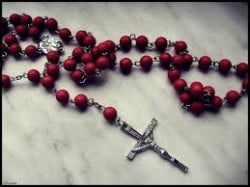
honor of the triumph accorded all of Christendom at Lepanto. Gregory XIII instituted the Feast of the Holy Rosary in 1573. It was later extended to the universal Church by Clement XI. Benedict XIII added it to the Breviary with the explanation that the Turks were defeated on the very day on which the Confraternities of the Most Holy Rosary throughout the world were offering up their rosaries as they had been asked to do by Pope St. Pius V.
Pope Leo XIII (who heard God permitting Satan 100 years to sift the Church) wrote no less than 12 encyclicals letters on devotion to the Rosary and dedicated the entire month of October to Our Lady of the Holy Rosary.
The Venetian attitude was to honor unequivocally the Holy Rosary of the Blessed Virgin Mary. They commissioned the building of a chapel to Our Lady of the Rosary. The walls were lined with records of the battle for there was no doubt in the Venetian mind of the cause of their victory… They inscribed the legend for all to see: Neither Valor, Nor Arms, Nor Leaders, But Our Lady Of The Rosary Gave Victory.
The Battle of Vienna, Austria 1683 and Our Lady of Czestochowa
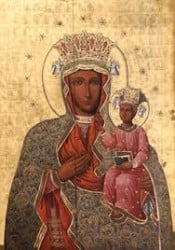 The Turks no longer posed a serious threat on the seas – the Battle of Lepanto had broken their domination and Ottoman sea power had been effectively contained in the Eastern Mediterranean.
The Turks no longer posed a serious threat on the seas – the Battle of Lepanto had broken their domination and Ottoman sea power had been effectively contained in the Eastern Mediterranean.
Now, 100 years after Lepanto, Europe was faced with land invasion. In Northern Europe a man named
John Sobieski assumed the Polish throne. He was famous for having out together a formidable army, spearheaded by a cavalry unit unlike any that Europe had ever seen before.
It was not until the Star and Crescent of the Turkish Empire ruled the Danube River, flew over Budapest Hungary, and was on the march toward Vienna, when the Papal legate arrived in Warsaw to request urgent aid from Poland. There was a vast Turkish army poised to lay siege to Vienna. Neither the Germans nor the Austrians had been able to defeat the Turkish invaders. Only King John III Sobieski had been victorious over them, and not just once, but three times.
The Turks approached Vienna and on July 13, surrounded it and began the siege. When news reached King John, he raised his heart to heaven and prayed, “Blessed Virgin of Czestochowa, allow me two miracles: that those in Vienna shall resist the siege until September and those of us outside reach there in time to save them.” Even though time was of the essence, the King of Poland and his advisors went to Jasna Gora to pray before the Black Madonna. After four days of prayer, as King John III Sobieski was preparing to leave the shrine, a priest handed him a picture of the Madonna suspended from a gold chain. The King gratefully accepted it and slipped it over his head and began the march with between 26,000 to 27,000 armed Polish troops.
The walled city of Vienna was surrounded by a ring of Turks. The Turks had almost as many tents pitched around Vienna as Sobieski had fighting men. The Turkish fighting army numbered about 115,000 reinforcements from Austria and Germany.
At 3:15 in the morning of September 12, 1683, the Feast of the Holy Name of Mary, King John III arose, prayed, put on the picture of Our Lady of Czestochowa, and launched the attack. It is said that the Polish men had the words, “Mary, help us” on their lips as they met the Turks in fierce combat.
The battle was over surprisingly early in the day. After the victory, John Sobieski, King of Poland, declared, “I came, I saw, and God conquered.”
This article can be found in Signs and Wonders Volume 24#1/2.

